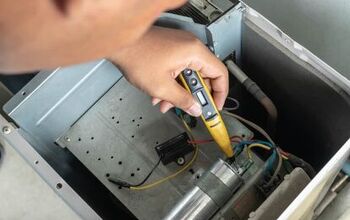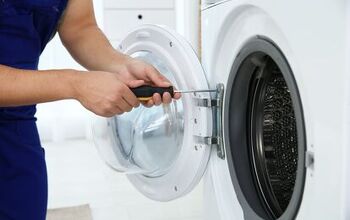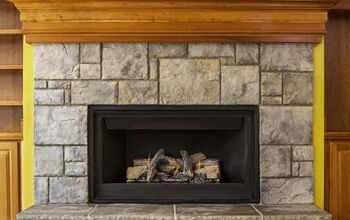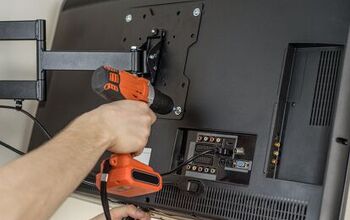How Long Do Fences Last? (Vinyl, Wood, Iron, Aluminum)

Before choosing a fence, knowing your intended use is important. You don’t have to get stuck with what your contractor recommends, but rather you can choose something that works for you. Need to install a privacy fence in your backyard? Wooden fences, for example, are a great option because they are both cost-effective and environmentally friendly.
In general, a typical wood fence will last 20 years. PVC or vinyl fences do not fade or rot easily and will last at least 20-30 years. Iron fences typically last about 20 years. A chainlink fence with a galvanized finish will last the longest, about 30-50 years. The life expectancy of a fence depends on the material used, weather conditions, and the level of maintenance.
Keep in mind that salt spray and snow can greatly reduce the lifespan of an iron or aluminum fence and cause it to rust. Now that we know the life expectancy of every common type of fence, let’s break down the longevity of each fence type in detail and discuss its pros and cons.
How Often Should You Replace A Fence?
If you maintain your fence properly, it can last between 20-50 years. How often you’ll have to replace it will mainly depend on the type of material and weather conditions. For example, if you live on a busy road, chances are salt spray will cause your fence to rust in as little as 10-15 years.
In areas with lots of snow, the longevity of a fence will also be affected negatively. The rule of thumb is, if your fence is older than you are, it’s time to replace it! But just damage isn’t the only reason you may want to replace your fence.
Perhaps your fence doesn’t provide enough privacy because it’s not high enough, or your fence isn’t high enough to stop your dog from jumping over. And, while replacing your fence will cost more than just repairing it, it can be a worthy investment for the right reason.
Should I Repair or Replace My Fence?
If you have to replace more than 20% of the fence pickets or panels, it’s better to replace the entire fence. This rule of thumb is useful when considering the time, money, and effort you will spend on a repair.
Remember that replacing fence posts is a difficult and expensive task than simply replacing pickets or panels. This is because the posts have to be dug out of the ground, and more times than not, the posts are mounted in the cement.
If your fence is old and has outlived its usefulness, a replacement is the best course of action. If you maintain your fence properly, it should last between 20-50 years.
When Repair-Only Makes Sense
When should you simply repair your fence? For wood fences, if it is slightly discolored, is splintering, or warping, it’s time for a repair. Inspect your fence first to determine the level of damage.
For a vinyl fence, repair it if you notice cracking or damage from heavy snow or a vehicle hitting the fence. Depending on what panels you used to install the fence, it could be just one picket or an entire section.
Aluminum fences are quite sturdy, but they are prone to damage in the case of an accident, such as a car or truck backing up into it. Some posts can become loose from shifting soil, which can be fixed with a backfill of soil or gravel. Keep in mind that most aluminum fence repairs will require the skill of a welder.
How Long Do Vinyl Fences Last?
The life expectancy of a typical vinyl fence is 20-30 years. How long a vinyl fence lasts will depend on the quality of the PVC. To ensure longevity, choose a trusted brand and check the manufacturer’s warranty. Most leading vinyl fence brands provide a warranty of at least 20 years and even a lifetime warranty in some cases.
Brands like Ply Gem use the best resins and solar stabilizers, which help with the prevention of fading and UV degradation to the fence. They use the highest quality raw materials. One of the largest manufacturers of outdoor products in North America, their products meet the code ICC- ES AC174, which is the code for all guardrail systems.
Benefits of a Vinyl Fence
1. Vinyl fences require minimal maintenance. They can easily be hosed off and don’t require routine maintenance. They retain their color, so you won’t have to worry about having to stain or repainting them. Since no maintenance and very few repairs are needed, you’ll save money on supplies and repair bills.
2. Vinyl fences are strong and flexible. Vinyl fences are roughly five times stronger than wood fences. You won’t have to deal with rust. Since vinyl doesn’t absorb moisture, such fences won’t rot, blister, or peel. Unlike wood fences, vinyl fences don’t attract termites and won’t be susceptible to water damage.
What’s more, vinyl fences are flexible. If you live in a city with strong wind and rain, vinyl fences are able to survive pretty harsh winters. Finally, it is easy to install and affordable. Vinyl fences are much cheaper than wood or iron, especially since you don’t have to shell out money for paints or stains.
3. Plenty of privacy. Unlike iron or aluminum, vinyl fences can offer the highest level of privacy. If you install one-piece panels, you won’t have to deal with the unusual spaces between the individual posts. Vinyl fences are perfect for backyards and pool enclosures.
4. Aesthetically pleasing. Vinyl fencing comes in many different styles, from picket fences to ornamental or privacy. Although vinyl fences are only available in white or tan colors, such shades are ideal for most situations.
How Long Do Wood Fences Last?
Most wood fences last between 10-15 years but can last up to 20 years with proper maintenance. The life expectancy of a wooden fence will depend on proper maintenance, including the replacement of individual boards and planks when needed.
Simply put, wood fences don’t last as long as they could in climates that are less damp. Without proper care, wooden fences will eventually rot. Wood fences can sag, warp, and crack over time, especially during harsh winters. And, an insect infestation is another potential issue.
If you live in areas like Western Oregon, the weather is bad for eight months out of the year, so that’s one area where wood fences don’t make sense to install. But not everything is bad about wood fences, let’s take a look at some benefits.
How Long Do Cedar Fences Last?
Untreated cedar fences typically last between 15 to 30 years. A type of wood, cedar is one of the most durable and long-lasting woods. Cedar wood also requires much less maintenance and doesn’t weather as fast as pine or spruce.
How Long Do Bamboo Fences Last?
When maintained the right way, bamboo fences last between 15-20 years. To maintain, bamboo fences will have to be sealed and stained regularly. Bamboo is a super high-quality and durable material. It is also a highly cost-effective fencing option.
How Long Does A Pine Fence Last?
A pine fence can last anywhere from 5-to 12 years. Pressure-treated pine fences can last the full 12 years, about half as long as cedar fences. Rarely, and with extreme maintenance, you’ll be able to keep your pine fence for as long as 15 years.
Benefits of Wood Fences
1. Stylish. Wood fences are so versatile that you can choose anything from French Gothic to an Arch Privacy fence. For a classic and inviting look, go for a picket fence. To surround a large area, a rail fence is a great choice.
2. Easy to install. The easiest fence to install is a wood fence. This is because you don’t have to install rails and pickets separately. To save time, go with a wood fence, which will take between 1-3 days, whether you’re a DIY or a professional.
3. Highly customizable. Wood fences come in various fence heights and have lots of matching accessories. Panels can be trimmed to your desired height.
4. Easy to paint or stain. Change your yard’s look just by simply painting or staining your wooden fence. While wood is naturally resistant to decay, painting or staining it will help minimize UV damage. Alternatively, you can treat the wood and let it age naturally.
5. Environmentally friendly. Wood is a natural material, so it’s naturally a green product. You can even treat the boards with stabilizers or preservatives to avoid swelling or termite damage.
How to Make a Wooden Fence Last Longer
1. Build your fence with metal fence posts. Wood fence posts are vulnerable to rot and insect damage due to moisture absorption. Wood posts aren’t made with chromated copper arsenate anymore, so they don’t last as long as they used to. With metal fence posts, you’ll enjoy decades of a solid foundation.
2. Add a rot board under your fence. A rot board or a kickboard will help defend your pickets from too much moisture. It fills the gap between your fence pickets and the ground. Choose a pressure-treated rot board to extend its life. With a rot board, your fence will last a lot longer.
3. Stain and seal your fence. Using a high-end stain and sealer will extend the life of your wooden fence and give it new life. Apply before or after the installation of your fence. Staining your fence will help repel moisture and rot. Choose professional-grade fence stain that won’t fade easily.
4. Inspect and repair yearly. Take a walk around your fence once a year to see if there are any issues with it. With a simple repair, you can avoid a costly repair or the need to completely replace your wood fence. Check for loose screws or nails and tighten them. Finally, look for any rot, sagging, or damage.
How Long Do Aluminum Fences Last?
Aluminum fences last between 30-50 years and last the longest compared to all other materials. Aluminum doesn’t rust as easily as other materials. Unlike wood, it does not crack, split, warp, or rot.
The material is so durable that fence installation companies often provide a lifetime warranty for aluminum fences. Maintenance is easy as you only have to hose down your fence every few weeks or months. This will get rid of any dirt, waste, or fertilizer chemicals in your yard.
Benefits of Aluminum Fences
1. Highly versatile. Aluminum fencing can be adjusted to meet the needs of your home’s landscape. You can install aluminum fences on flat or sloped land, without having to worry about unappealing gaps. It can be built to your desired height (following local code) and comes in various styles, colors, and textures.
2. Affordable. While aluminum fencing looks like wrought or steel, it is a lot cheaper to manufacture. Although it’s initially more expensive than wood, it doesn’t have to be maintained so long-term it is actually affordable.
3. Not prone to corrosion. Aluminum fencing is one of the least vulnerable fence materials when it comes to corrosion. Unlike steel, aluminum doesn’t rust because it reacts less to moisture. However, you’ll want to get an aluminum fence with a protective finish to avoid rusting.
4. Easy to maintain. You don’t have to paint or an aluminum fence, something that’s not true for wrought iron or wood fences. Due to its powder paint coating when manufactured, aluminum fences last for decades. Regular maintenance simply just isn’t necessary.
5. Sustainable & beautiful appearance. Aluminum is a highly recyclable material. Choose a fence made from recycled aluminum if possible. And, while most owners stick to a black aluminum fence, you can choose to go with one of the many beautiful shades, like Speckled Walnut or a Gloss Beige.
When Should I Replace My Fence Post?
Assess the damage to your wood fence post. If the posts pull right out of the ground or the rot is greater than 30% of the post, it’s time to replace it. Sometimes the wood will be rotten from termite damage, and it will crumble in your hands. That’s a clear sign of a need for replacement.
Does Staining a Fence Make It Last Longer?
Staining a fence will definitely make it last longer. Staining your fence will extend the lifespan of your wood fence by anywhere from 1-8 years. Staining is needed every 3-6 years to protect and extend the lifetime of your fence.
So, Which Fence Type Lasts the Longest?
The two most durable and longest-lasting fencing options are wrought iron or steel fences. Steel is lighter and more versatile than wrought iron, which is why it is a favorite among many homeowners. At the same time, steel fencing can be extremely durable and a solid option.
But, if you prefer the American Dream of a white picket fence, vinyl will be the material you want to go with. It is durable, easy to maintain, and can last longer than 20 years. You simply can’t go wrong with it.
We know wooden fences are beautiful, but they’re susceptible to rot and other damage. They have to be constantly maintained with staining and painting. If you’re shopping the look, wooden fences are the most beautiful choice.
But ultimately, the type of fence you choose will come down to personal preference, your budget, and how much maintenance you’re willing to put in.

We are a team of passionate homeowners, home improvement pros, and DIY enthusiasts who enjoy sharing home improvement, housekeeping, decorating, and more with other homeowners! Whether you're looking for a step-by-step guide on fixing an appliance or the cost of installing a fence, we've here to help.
More by Upgraded Home Team



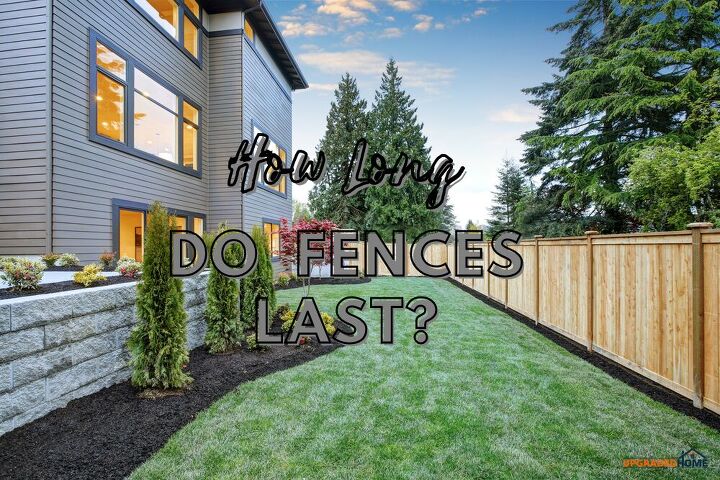














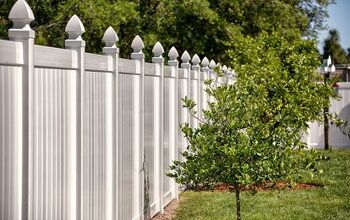
![The 10 Best Table Saws - [2022 Reviews & Buyer's Guide]](https://cdn-fastly.upgradedhome.com/media/2023/07/31/9070645/the-10-best-table-saws-2022-reviews-buyer-s-guide.jpg?size=350x220)


![10 Best Cordless Leaf Blowers – [2022 Reviews & Ultimate Guide]](https://cdn-fastly.upgradedhome.com/media/2023/07/31/9070789/10-best-cordless-leaf-blowers-2022-reviews-ultimate-guide.jpg?size=350x220)



